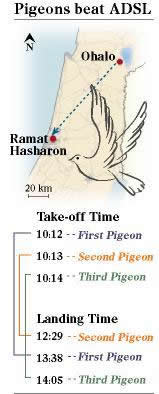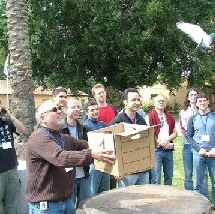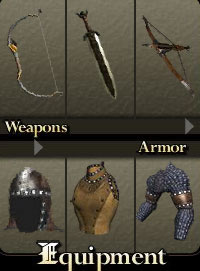 Google is busily hatching plans to dramatically improve the results of internet news searches by introducing a system that ranks articles by quality rather than just their date and relevance to search terms.
Google is busily hatching plans to dramatically improve the results of internet news searches by introducing a system that ranks articles by quality rather than just their date and relevance to search terms.
Currently, typing something like ‘Iraq’ into Google, will generate zillions of “hits”, ranked in order of relevance or by date, so that the most recent or most focused appear at the top of a monster list.
The problem with this approach is that news stories from more authoritative sources – say the CNN or the BBC – can be knocked off the first page of results because they are not as recent or as relevant to the keywords typed into the search box.
Google hopes to address this problem by building a smartypants database that will compare the track record and credibility of global news sources and adjust the ranking of any search results accordingly.
The database will do its thang by continually monitoring the number of stories from all news sources while making a note of average story length, number with bylines, the number of the news agencies cited, along with how long they have been in business.
And there’s more! Google’s database will also record the number of staff a news source employs, monitor the volume of internet traffic to its website and check its international appeal by counting the number of countries accessing the site.
A big box stuffed full of levers and blinking lights will then absorb all these parameters, weigh them according to a clever-clogs formulae it is constructing, and then distil them down to create a single value.
We like to think that this number – then used to rank the results of any news search – is noisily outputted on a long string of ticker tape, but we might be getting a bit carried away.
Google’s ambitious system was unveiled by patents filed in the US and around the world in 2003 which revealed that the same methodology could be employed to rank other search results, such as sales and services.
Campaigners and activists may not welcome this news though, as Google’s proposed system suggests that it will be harder for independent, non-mainstream news sites to appear in the top rankings.
One of the beauties of the web is that of you type in the name of the uber-corporates Nestle into Google, the Nestlé boycott campaign appears on the first page of results.
I wouldn’t like that to change.
 Yahoo has announced plans to ramp up the feature set of its
Yahoo has announced plans to ramp up the feature set of its  The service currently only allows users to include content from other Yahoo services such as Yahoo Photos and Yahoo Music, but now Yahoo are to offer the inclusion of RSS (Really Simple Syndication) feeds from other sources.
The service currently only allows users to include content from other Yahoo services such as Yahoo Photos and Yahoo Music, but now Yahoo are to offer the inclusion of RSS (Really Simple Syndication) feeds from other sources. Like a hungry, hyperactive terrier, Firefox continues to take great chunks out of Microsoft’s market share as the Mozilla Foundation announces its 50 millionth download.
Like a hungry, hyperactive terrier, Firefox continues to take great chunks out of Microsoft’s market share as the Mozilla Foundation announces its 50 millionth download. Fully released last November, Firefox has delivered a turbo-charged size nine up the backside of the Web browser market which seemed to be heading for stagnant domination by Microsoft’s ubiquitous Internet Explorer.
Fully released last November, Firefox has delivered a turbo-charged size nine up the backside of the Web browser market which seemed to be heading for stagnant domination by Microsoft’s ubiquitous Internet Explorer. This has Friday Story written all over it. A few Israeli geeks set up a test to compare the speed of delivering data via pigeon (PEI – Pigeon Enabled Internet, as they’ve labelled it) compared with ADSL.
This has Friday Story written all over it. A few Israeli geeks set up a test to compare the speed of delivering data via pigeon (PEI – Pigeon Enabled Internet, as they’ve labelled it) compared with ADSL. As you know, the A in ADSL stands for Asynchronous, so the transferred rates listed equate to the speed that information is received. Upload rates are significantly lower. By their calculations, uploading 4Gb of data on ADSL would take around 96 hours – making the pigeon transfer significantly more efficient, equivalent to a T1 connection at 1.5Mbps.
As you know, the A in ADSL stands for Asynchronous, so the transferred rates listed equate to the speed that information is received. Upload rates are significantly lower. By their calculations, uploading 4Gb of data on ADSL would take around 96 hours – making the pigeon transfer significantly more efficient, equivalent to a T1 connection at 1.5Mbps. Chat around the office lead us to wonder what the next in the endless list of variation on creatures being used to transfer information would be. Nicolas Nova has provided the answer –
Chat around the office lead us to wonder what the next in the endless list of variation on creatures being used to transfer information would be. Nicolas Nova has provided the answer –  Sony have produced a portable games console which on its own merit is going to sell a lot of units. However it has the possibility of becoming a portable media hub that will give even Microsoft a jolt by driving into their Portable Media Center market.
Sony have produced a portable games console which on its own merit is going to sell a lot of units. However it has the possibility of becoming a portable media hub that will give even Microsoft a jolt by driving into their Portable Media Center market. The system uses Sony’s 1.8″ UMD optical disk which comes in a protective sheath (like a minidisc). They’re small enough so you could easily carry a few around with you (though don’t eject them unless there’s something solid and accessible beneath you as they have a tendency to fly out and disappear somewhere awkward). There’s also a Memory Stick due (32MB supplied) to allow game saves and other features.
The system uses Sony’s 1.8″ UMD optical disk which comes in a protective sheath (like a minidisc). They’re small enough so you could easily carry a few around with you (though don’t eject them unless there’s something solid and accessible beneath you as they have a tendency to fly out and disappear somewhere awkward). There’s also a Memory Stick due (32MB supplied) to allow game saves and other features. The system looks like a USB memory device when attached to a PC (which basically gives access to the Memory Stick) and you can store audio and video on it. Sensibly, Sony support MP3 directly on the PSP, though it will also support ATRACplus encoded music. Interestingly, if someone decides to produce UMD music disks, they only support ATRACplus and linear PCM). Video is H.264/MPEG-4 AVC on the UMD and MPEG-4 SP, AAC on the memory stick.
The system looks like a USB memory device when attached to a PC (which basically gives access to the Memory Stick) and you can store audio and video on it. Sensibly, Sony support MP3 directly on the PSP, though it will also support ATRACplus encoded music. Interestingly, if someone decides to produce UMD music disks, they only support ATRACplus and linear PCM). Video is H.264/MPEG-4 AVC on the UMD and MPEG-4 SP, AAC on the memory stick. Once the PSP has real Internet capability it will be a media powerhouse, the screen size is about right for watching movies on the go. You could do this now by converting a current MPEG-2 (DVD) to MPEG-4 and storing it on the memory stick (ignoring all legal ramifications), but in future it’s more than likely you’ll be able to stream movies (or audio) directly to the unit. Sony as a music publisher and movie house, is likely to want to sell its content to a market of portable viewers – it owns both ends of the stick.
Once the PSP has real Internet capability it will be a media powerhouse, the screen size is about right for watching movies on the go. You could do this now by converting a current MPEG-2 (DVD) to MPEG-4 and storing it on the memory stick (ignoring all legal ramifications), but in future it’s more than likely you’ll be able to stream movies (or audio) directly to the unit. Sony as a music publisher and movie house, is likely to want to sell its content to a market of portable viewers – it owns both ends of the stick. The battle between Google and Yahoo continues to heat up, with Yahoo ramping up the feature set of its ‘My Web’ suite of personal search tools.
The battle between Google and Yahoo continues to heat up, with Yahoo ramping up the feature set of its ‘My Web’ suite of personal search tools. Yahoo claim that their service is “better than bookmarks”, with users able to save an exact copy of a page along with the link, so that saved content will always be there when users return to the page.
Yahoo claim that their service is “better than bookmarks”, with users able to save an exact copy of a page along with the link, so that saved content will always be there when users return to the page. Yahoo’s search history tool bears more than a passing similarity to the one released by Google last week and reflects the fierce competition between the two companies.
Yahoo’s search history tool bears more than a passing similarity to the one released by Google last week and reflects the fierce competition between the two companies. BT Rich Media has cuddled up to Sportfive, a French sports marketing group, and announced a partnership to make 2006 Football World Cup qualifying and friendly games available to fans streamed over broadband on the Internet.
BT Rich Media has cuddled up to Sportfive, a French sports marketing group, and announced a partnership to make 2006 Football World Cup qualifying and friendly games available to fans streamed over broadband on the Internet. Football bonkers viewers will be able to choose between 250Kbps or 500Kbps quality streams for approximately £7 (~US$13 ~€10), or alternatively download the entire match to keep forever for around £5 (~US$9.50 ~€7). As a long suffering Wales fan, I have to admit that there’s several games which I never wish to see again!
Football bonkers viewers will be able to choose between 250Kbps or 500Kbps quality streams for approximately £7 (~US$13 ~€10), or alternatively download the entire match to keep forever for around £5 (~US$9.50 ~€7). As a long suffering Wales fan, I have to admit that there’s several games which I never wish to see again! The games will be served up on http://www.qualifiers2006.com and promoted to over 10 million users via a range of affiliate sites such as soccernet.com,.teamtalk.com, sportinglife.com and rivals.net .
The games will be served up on http://www.qualifiers2006.com and promoted to over 10 million users via a range of affiliate sites such as soccernet.com,.teamtalk.com, sportinglife.com and rivals.net . In an astonishing volte-face, Sony Online Entertainment (SOE) has announced that it now endorses the auctioning of virtual items from its massively popular online game, Everquest II – with the electronics giant pocketing a cut of the cash, naturally.
In an astonishing volte-face, Sony Online Entertainment (SOE) has announced that it now endorses the auctioning of virtual items from its massively popular online game, Everquest II – with the electronics giant pocketing a cut of the cash, naturally. Personally, we’d rather buy a round of lovely real ale than shell out for the Dark Lord of Deltronia’s Mystical Turbo Sword of Mwegneli, but as we’ve reported before (
Personally, we’d rather buy a round of lovely real ale than shell out for the Dark Lord of Deltronia’s Mystical Turbo Sword of Mwegneli, but as we’ve reported before ( “There already is a ‘virtual class system’ within the game itself – you earn status and faction standing, money, prestige, titles, fancy clothes and transport, you start living in a hovel but can move on up to luxury apartments etc – But at least till now you could assume that most people had ‘earned’ those things by playing the game.
“There already is a ‘virtual class system’ within the game itself – you earn status and faction standing, money, prestige, titles, fancy clothes and transport, you start living in a hovel but can move on up to luxury apartments etc – But at least till now you could assume that most people had ‘earned’ those things by playing the game. “I’m not sure of the mechanics in EQII, but in WoW (World of Warcraft) they have mitigated the potential for selling items somewhat by introducing the concept of having things bind to that character when it is picked up, meaning you can’t transfer items to other players, hence no selling though eBay and the like.”
“I’m not sure of the mechanics in EQII, but in WoW (World of Warcraft) they have mitigated the potential for selling items somewhat by introducing the concept of having things bind to that character when it is picked up, meaning you can’t transfer items to other players, hence no selling though eBay and the like.” For some gamers, an officially sanctioned auction site is an inevitable consequence of the growing popularity of virtual gaming, with Sony’s cut, a reasonable price to pay for eliminating a lot of scams.
For some gamers, an officially sanctioned auction site is an inevitable consequence of the growing popularity of virtual gaming, with Sony’s cut, a reasonable price to pay for eliminating a lot of scams. A government-backed study has revealed that more than one in 10 UK teenagers frequently use the Internet to look at “adult-only” Web sites.
A government-backed study has revealed that more than one in 10 UK teenagers frequently use the Internet to look at “adult-only” Web sites. When it came to trusting the media, television was seen as the most trustworthy form of mass communication, with 48% trusting it completely or a lot.
When it came to trusting the media, television was seen as the most trustworthy form of mass communication, with 48% trusting it completely or a lot. A UK train operator has claimed that its passengers will be able to wirelessly access the Internet on all its trains by May 2007 after widespread passenger take-up of the service.
A UK train operator has claimed that its passengers will be able to wirelessly access the Internet on all its trains by May 2007 after widespread passenger take-up of the service. GNER’s chief operating officer Jonathan Metcalfe enthused about onboard Wi-Fi, claiming that it would make the travelling experience “more enjoyable” for consumers and that it would “encourage more people to choose rail instead of driving or flying.”
GNER’s chief operating officer Jonathan Metcalfe enthused about onboard Wi-Fi, claiming that it would make the travelling experience “more enjoyable” for consumers and that it would “encourage more people to choose rail instead of driving or flying.”